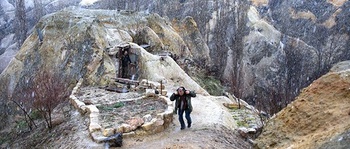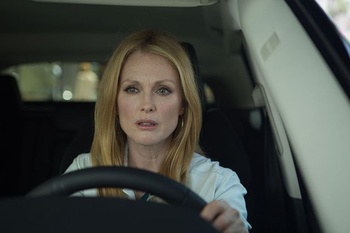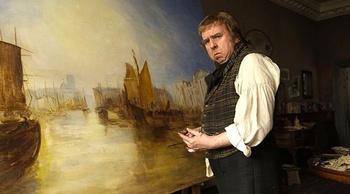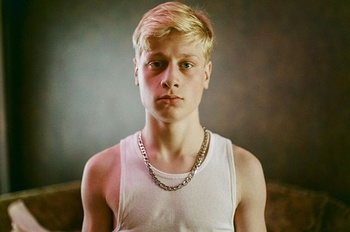(Winter Sleep)
The last Cannes Film Festival will be a debated topic for a few more days. One interesting question is whether the 67th edition wasn’t actually better than the award-winning films would make you think. But that does not change the facts: the prizes have been handed out, and we now know which films will be the flavour of the summer in Brussels over the next few months.
Two AGENDA’s back, I wrote: “To win the Golden Palm this year, you’ll have to get past Nuri Bilge Ceylan.” That prediction turned out to be true. In the year that Turkish cinema is celebrating its centenary, the film loving Turk’s 3.5-hour long Winter Sleep won the highly coveted film award. It didn’t actually take much skill at prediction, though. With two Grand Prix, Ceylan has just missed the main prize twice already. His films are invariably cinematographic masterpieces dripping with severity. It was only a matter of time before he would finally get to stand on the highest step of the podium. Just like Ken Loach in 2006 with The Wind That Shakes The Barley, however, it is not his best film that won the prize. Winter Sleep is slightly less peerless than Once Upon a Time in Anatolia.
Cannes Film Festival: winter sleep is coming


(Winter Sleep)
Winter landscapes as far as the eye can see are interspersed with long discussions, fights, and mock battles between Man and Woman. He is a cynical hotel owner who thinks he deserves his wealth. She advocates greater commitment to the less affluent community around them. Ceylan is often called an heir to Michelangelo Antonioni, but Winter Sleep is also reminiscent of Ingmar Bergman and the Russian author Anton Chekhov. Winning the Golden Palm will hopefully convince distributors to put more effort into the release of Winter Sleep than they did for Once Upon a Time in Anatolia.
Incredible blandness
We can’t argue with the Golden Palm, but the same cannot be said for the Grand Prix. That went to Le meraviglie (The Wonders), the second feature film by Italian director Alice Rohrwacher. There is nothing wrong with this nostalgic and tender story about a family of beekeepers who don’t realise they’ve been overtaken by time. After his strong portrayal as an authoritarian father who underestimates his eldest daughter, the Belgian Sam Louwyck may hope for more interesting roles in European films.
Winter landscapes as far as the eye can see are interspersed with long discussions, fights, and mock battles between Man and Woman. He is a cynical hotel owner who thinks he deserves his wealth. She advocates greater commitment to the less affluent community around them. Ceylan is often called an heir to Michelangelo Antonioni, but Winter Sleep is also reminiscent of Ingmar Bergman and the Russian author Anton Chekhov. Winning the Golden Palm will hopefully convince distributors to put more effort into the release of Winter Sleep than they did for Once Upon a Time in Anatolia.
Incredible blandness
We can’t argue with the Golden Palm, but the same cannot be said for the Grand Prix. That went to Le meraviglie (The Wonders), the second feature film by Italian director Alice Rohrwacher. There is nothing wrong with this nostalgic and tender story about a family of beekeepers who don’t realise they’ve been overtaken by time. After his strong portrayal as an authoritarian father who underestimates his eldest daughter, the Belgian Sam Louwyck may hope for more interesting roles in European films.

(Maps to the Stars)
But there is nothing incredible about Le meraviglie, at least not compared to the competition. With this selection, the jury chaired by Jane Campion has saddled us with an honour roll that does not quite reflect how strong this edition of Cannes really was. Le meraviglie winning the Grand Prix was a surprise because it left many far superior films behind empty-handed. For example, Timbuktu by Abderrahmane Sissako, a humanist perspective on the misery inflicted by Jihadi in Mali, or Still the Water by Naomi Kawase, a spiritual film about two young people confronted with death. And the biggest disappointment of all is that for the first time ever, the Dardenne brothers were sent back to Belgium with nothing.
But there is nothing incredible about Le meraviglie, at least not compared to the competition. With this selection, the jury chaired by Jane Campion has saddled us with an honour roll that does not quite reflect how strong this edition of Cannes really was. Le meraviglie winning the Grand Prix was a surprise because it left many far superior films behind empty-handed. For example, Timbuktu by Abderrahmane Sissako, a humanist perspective on the misery inflicted by Jihadi in Mali, or Still the Water by Naomi Kawase, a spiritual film about two young people confronted with death. And the biggest disappointment of all is that for the first time ever, the Dardenne brothers were sent back to Belgium with nothing.
Of course you can’t win them all, but Deux jours, une nuit is better than many of the films that did win prizes. Consequently, Campion and co could have ignored the non-argument that they have already received enough adulation, as well as the misconception that they always make the same film. The press received the socially and politically charged drama very well and tipped Marion Cotillard as one of the major contenders to win the Best Actress Award. In the end, however, that went to another big name and excellent actress: Julianne Moore. In David Cronenberg’s grim satire of vacuous and incestuous Hollywood Maps to the Stars, she death-defyingly plays a somewhat older Hollywood actress who doesn’t realise how ridiculous her behaviour is sometimes and desperately longs for the fame and glory that was bestowed on her mother.
Young and old
The Best Actor Award went to Timothy Spall, the portly British actor who is well-known to children as Peter Pettigrew from Harry Potter and to movie lovers as Mike Leigh’s fetish actor. He previously starred in Secrets and Lies and All or Nothing, and it’s only fair that his talent is being highlighted for once. Spall plays the lead role in the surprisingly pictorial Mr. Turner: Mike Leigh’s (self-)portrait of J.M.W. Turner, the sulky 19th-century painter who struggled with emotional states but whose landscapes and maritime tableaux paved the way for 20th-century painting.
Young and old
The Best Actor Award went to Timothy Spall, the portly British actor who is well-known to children as Peter Pettigrew from Harry Potter and to movie lovers as Mike Leigh’s fetish actor. He previously starred in Secrets and Lies and All or Nothing, and it’s only fair that his talent is being highlighted for once. Spall plays the lead role in the surprisingly pictorial Mr. Turner: Mike Leigh’s (self-)portrait of J.M.W. Turner, the sulky 19th-century painter who struggled with emotional states but whose landscapes and maritime tableaux paved the way for 20th-century painting.

(Mr. Turner)
Other award-winning films to look out for are Foxcatcher by the American Bennett Miller and Leviafan by the Russian Andrey Zvyagintsev. Miller’s award for best director is heartening to anyone who loves classic, outstandingly narrated American cinema. He has guided Mark Ruffalo, hunk Channing Tatum, and comedian Steve Carell to brilliant performances in an oedipal psychodrama about an Olympic wrestling champion who is bought by a wealthy industrialist. In the background, you hear the swan song of an America whose dreams can no longer come true. Zvyagintsev doesn’t pull any punches for Putin’s Russia either, at least if you read between the lines. In majestic scenes, Leviafan tells the story of the inevitable demise of an ordinary Russian who has more bad luck than Job in the Bible. He doesn’t stand a chance against a corrupt mayor, power-hungry church leaders, glib-tongued lawyers, powerless judges, partisan law-enforcement, and unfaithful women. No wonder he drinks vodka as though it were water.
Other award-winning films to look out for are Foxcatcher by the American Bennett Miller and Leviafan by the Russian Andrey Zvyagintsev. Miller’s award for best director is heartening to anyone who loves classic, outstandingly narrated American cinema. He has guided Mark Ruffalo, hunk Channing Tatum, and comedian Steve Carell to brilliant performances in an oedipal psychodrama about an Olympic wrestling champion who is bought by a wealthy industrialist. In the background, you hear the swan song of an America whose dreams can no longer come true. Zvyagintsev doesn’t pull any punches for Putin’s Russia either, at least if you read between the lines. In majestic scenes, Leviafan tells the story of the inevitable demise of an ordinary Russian who has more bad luck than Job in the Bible. He doesn’t stand a chance against a corrupt mayor, power-hungry church leaders, glib-tongued lawyers, powerless judges, partisan law-enforcement, and unfaithful women. No wonder he drinks vodka as though it were water.

(Mommy)
In a half-hearted attempt to give the academic honour roll some sparkle, the jury prize was jointly awarded to the youngest and the oldest director. The talented Canadian director Xavier Dolan’s Mommy, a tribute to a mother fighting for her unruly son, provided some youthful impetuosity and cinematic panache. At 83, Jean-Luc Godard did something similar. Don’t ask us how best to approach the experimental Adieu au langage, but the great French New Wave icon certainly livened things up a bit.
And so much more
The main competition is Cannes’s artery, but there were also some great film revelations in the peripheral sections (out of competition, Un Certain Regard) and parallel festivals (Semaine de la Critique, La Quinzaine des Réalisateurs). In the Quinzaine, Belgian director Fabrice Du Welz made a good impression with the bloody and passionate Alleluia. Other good films included Bande de filles by Céline Sciamma, the comedy Pride, and the Frederick Wiseman documentary National Gallery.
In a half-hearted attempt to give the academic honour roll some sparkle, the jury prize was jointly awarded to the youngest and the oldest director. The talented Canadian director Xavier Dolan’s Mommy, a tribute to a mother fighting for her unruly son, provided some youthful impetuosity and cinematic panache. At 83, Jean-Luc Godard did something similar. Don’t ask us how best to approach the experimental Adieu au langage, but the great French New Wave icon certainly livened things up a bit.
And so much more
The main competition is Cannes’s artery, but there were also some great film revelations in the peripheral sections (out of competition, Un Certain Regard) and parallel festivals (Semaine de la Critique, La Quinzaine des Réalisateurs). In the Quinzaine, Belgian director Fabrice Du Welz made a good impression with the bloody and passionate Alleluia. Other good films included Bande de filles by Céline Sciamma, the comedy Pride, and the Frederick Wiseman documentary National Gallery.
Because all these films will soon be on general release in cinemas, it may be more interesting to opt for something different when Cinematek starts rescreening the Quinzaine on 20 June. Highlights that will not be released in Belgium include Whiplash (jazz teacher drives a drummer insane), the fresh French comedy Les combattants, and The Tale of Princess Kaguya, an animated epic by Studio Ghibli founder Isao Takahata. The nice thing about Cannes is that it all still has to start, one film at a time over the following months.
Read more about: Film , Events & Festivals
Fijn dat je wil reageren. Wie reageert, gaat akkoord met onze huisregels. Hoe reageren via Disqus? Een woordje uitleg.